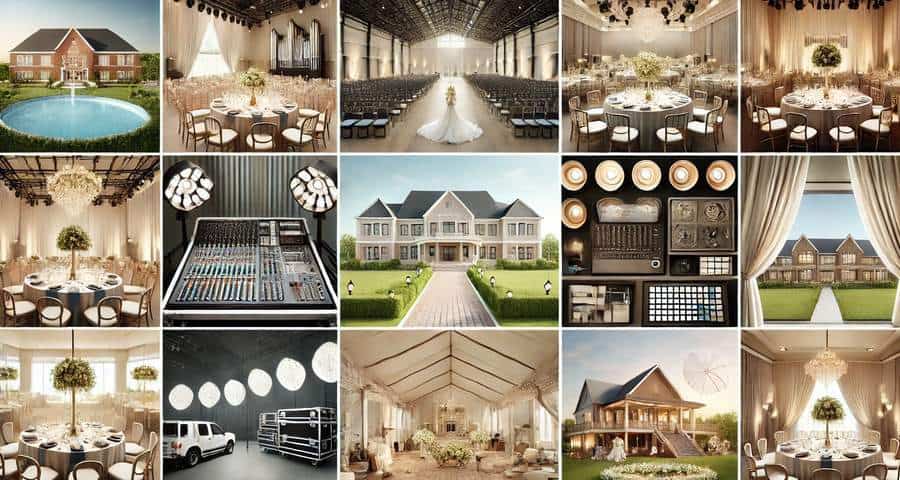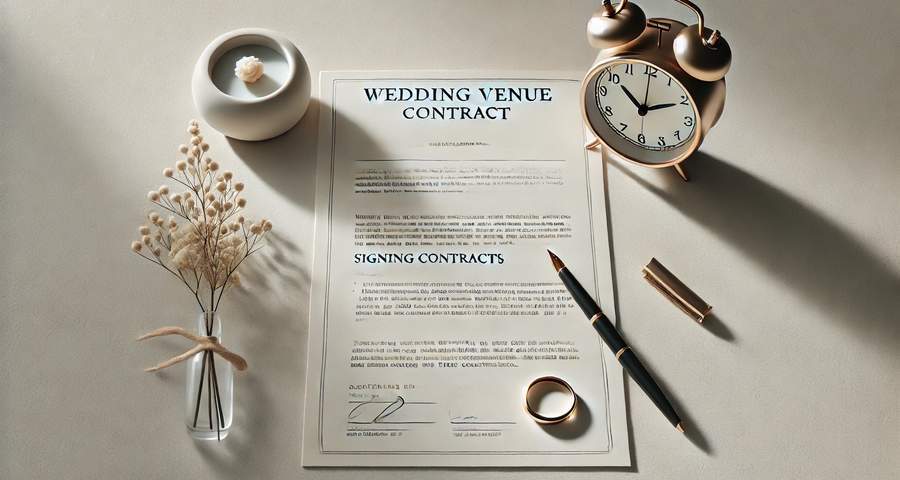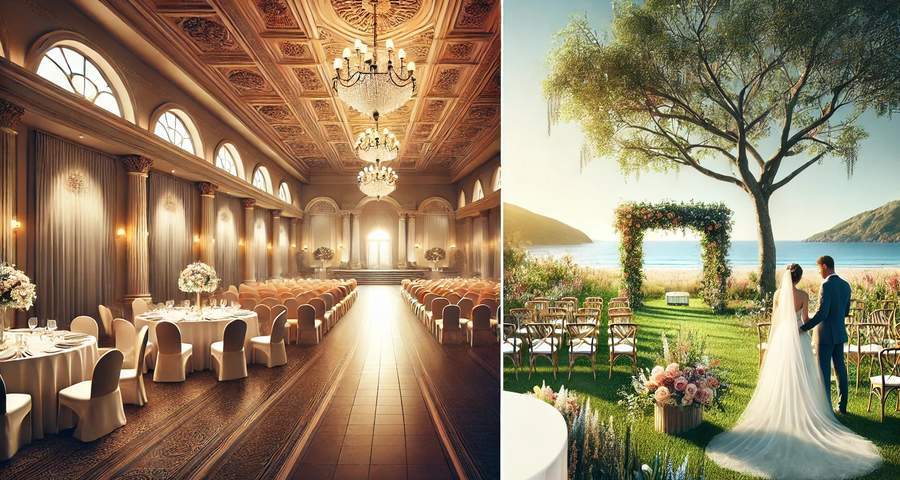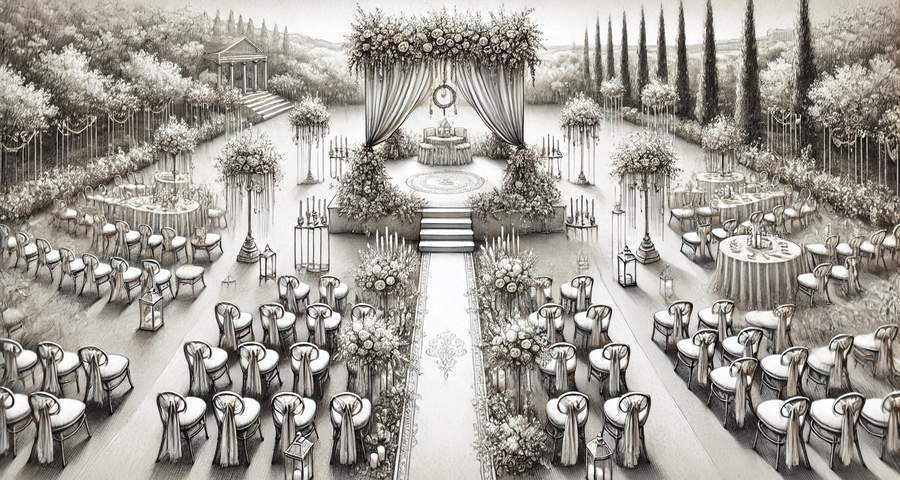Your wedding ceremony venue is far more than just a location, it’s the canvas upon which your love story unfolds.
The setting you choose sets the tone for your entire day, reflecting your personal style and the unique bond you share.
Selecting the perfect location for your ceremony is one of the most crucial decisions in your wedding planning journey. It’s where you’ll exchange vows, create lasting memories, and begin the next chapter of your life together.
If you’re just starting to plan your wedding, you might find my Step-by-Step Guide to Wedding Planning very useful.
Determining Your Priorities for Your Ceremony Venue

By clearly defining what’s most important to you before you begin your search, you can streamline the decision-making process, reduce stress, and ensure that your wedding ceremony is everything you hoped it would be.
- Budget: Knowing your total budget for the venue helps in filtering options that are within your financial means and prevents overspending.
- Guest Capacity: You need to have a rough estimate of your guest list to ensure the venue can accommodate everyone comfortably.
- Location: The venue’s location should be convenient for most guests and ideally close to or easily accessible from accommodation if many are traveling from afar.
- Date Availability: If you have a specific date or season in mind, this will significantly influence your choice of venue. Some venues book up far in advance, especially during peak wedding seasons.
- Amenities and Services: Assess what amenities the venue offers, such as on-site catering, audio-visual equipment, furniture, and whether it has adequate facilities like parking and handicap accessibility.
- Ceremony Requirements: Consider any specific needs for your ceremony, such as an altar, adequate aisle length, or space for specific rituals that are part of your wedding.
- Indoor vs. Outdoor: Decide if you prefer an indoor or outdoor ceremony, keeping in mind weather considerations for outdoor venues.
- Lighting and Acoustics: Evaluate the venue’s natural light, which is crucial for photography, and its acoustics to ensure all guests can hear the ceremony clearly.
- Style and Atmosphere: Determine the style or atmosphere you want for your ceremony. Whether you’re looking for something romantic, modern, or traditional, the venue should complement the theme of your wedding.
- Restrictions: Be aware of any venue restrictions that might impact your event, such as noise ordinances, decoration limitations, and specific ceremony protocols.
- Privacy and Exclusivity: Depending on the type of ceremony, you might prefer a venue that offers complete privacy and exclusivity.
Types of Wedding Ceremony Venues

The venue you choose for your wedding ceremony sets the stage for your entire day.
Whether you dream of a grand traditional wedding in a church, a whimsical garden affair, or a sophisticated celebration in a modern art gallery, there is a venue out there that will perfectly match the vision of your special day.
- Traditional Church Weddings: Churches offer a spiritual and solemn setting, ideal for those who view marriage as a sacred commitment under God or just like the solemn and reverent atmosphere with beautiful architectural details and stained glass windows, they offer a timeless backdrop for your vows.
- Beach Ceremonies: Offering a natural, open-air environment by the sea, beach venues are typically casual and relaxed. These locations boast scenic ocean views and a laid-back vibe, perfect for intimate gatherings and sunset vows.
- Garden Weddings: Set in lush, landscaped areas, garden venues are filled with flowers, greenery, and natural beauty. These picturesque and colourful settings are ideal for daytime ceremonies, offering a vibrant backdrop for your special moment.
- Historic Buildings: Castles, mansions, and estates serve as historic buildings that provide a grandeur and rich history. These venues are architectural gems, offering unique details from various historical periods, perfect for a regal wedding.
- Hotel Weddings: Hotels are convenient and versatile, providing elegant ballrooms, catering, and accommodations under one roof. Ideal for large and formal ceremonies, they simplify the planning process by offering comprehensive services.
- Country Clubs and Resorts: These venues offer an all-inclusive wedding experience with beautiful outdoor and indoor settings. Country clubs and resorts are great for larger weddings, providing catering, entertainment, and simplification of the wedding planning process.
- Barn and Farm Weddings: Featuring rural landscapes and wooden structures, barns and farms offer a rustic and cosy atmosphere. These venues are perfect for couples seeking a relaxed, country-style wedding with a homely vibe.
- Vineyard Ceremonies: Set amongst rows of grapevines, vineyards provide stunning landscape views and a romantic setting. Ideal for couples looking for natural beauty and elegance, vineyards offer a picturesque and peaceful backdrop.
- Urban Rooftops: Urban rooftop venues offer a modern and chic setting with panoramic views of the city skyline. Perfect for contemporary couples, these venues provide a unique and vibrant atmosphere for a memorable wedding.
- Historic Sites: Rich in charm and elegance, historic sites like majestic castles and old mansions tell a unique story. These venues are perfect for a vintage theme, providing a spectacular backdrop and a touch of history.
- Modern Art Galleries and Museums: Surrounded by art and culture, modern art galleries and museums offer a sophisticated environment. Ideal for couples who appreciate contemporary aesthetics, these venues serve as a unique and cultured setting for your ceremony.
Practical Considerations

When selecting a venue for your wedding ceremony, considering these practical aspects is crucial. They ensure that the venue is not only beautiful but also highly functional, providing a seamless and memorable experience for you and your guests.
- Weather Contingencies: For outdoor venues, it’s essential to have a plan in place for inclement weather. Check if the venue offers indoor options, tents, or canopies that can be quickly utilized if the weather changes unexpectedly.
- Acoustics and Audio Equipment: Ensure the venue has good acoustics for clear sound transmission of vows and music. Check if the venue has a built-in sound system or if you need to rent equipment. This is crucial for ensuring all guests can hear the ceremony clearly.
- Parking and Transportation: Consider the availability of parking spaces and the ease of transportation to and from the venue. For venues with limited parking, you might need to arrange additional transportation options or shuttle services for your guests.
- Availability of Amenities: Critical amenities include adequate restrooms, changing rooms for the wedding party, and possibly even space for caterers to set up. Ensure these facilities are accessible and sufficient for the size of your guest list.
- Accessibility Features: Make sure the venue is accessible to everyone, including elderly guests and those with disabilities. Features such as ramps, elevators, and accessible restrooms are essential to accommodate all your guests comfortably.
- Lighting: Consider the natural light available, especially for indoor venues or evening ceremonies, and any additional lighting needs. Proper lighting is important for both the atmosphere of the ceremony and for quality photography/videography.
- Decoration Possibilities: Assess what the venue allows in terms of decorations. Some venues may have restrictions on hanging items, using candles, or bringing in certain types of decor.
- Venue Experience: Inquire about the venue’s experience in hosting weddings. Venues accustomed to weddings often have staff who can provide valuable advice and assistance.
- Proximity to Accommodations: For out-of-town guests, consider how close the venue is to hotels or other lodging options. This ensures convenience for your guests and can enhance their overall experience.
- Seating Arrangements and Capacity: Assess the venue’s capacity and the flexibility of seating arrangements it can accommodate. This will influence both the number and the comfort of your guests during the ceremony.
Photographic Opportunities

Your wedding day is a momentous occasion filled with love, joy, and memories. Although the day itself will pass quickly, the photographs will remain for the entirety of your marriage. These images will not only become a cherished heirloom but also a way to share the story of your union with future generations.
The photography session, typically held between the ceremony and reception, is crucial to maximise this time to capture beautiful, lasting memories.
- Proximity and Convenience: The location of your ceremony and reception plays a critical role in your wedding photography. Choosing venues with diverse photographic settings is essential due to the limited time available between the ceremony and reception. A venue that offers a variety of picturesque spots on-site or nearby is ideal to maximise your photography time.
- Capturing Every Moment: Each minute of your wedding day is precious, and having a venue that provides a range of backdrops allows you to move efficiently from one photo shoot to another. This ensures a smooth transition and more opportunities to capture various styles of photos.
- Identifying Photogenic Spots: Work with your photographer to identify the best spots for photos at your venue prior to your wedding day. This pre-planning can save time and help you focus on enjoying your day.
- Natural Settings and Architectural Elements: Utilise gardens, courtyards, or water features for natural and romantic shots. The venue’s unique architectural features like staircases, balconies, or artistic walls can also add a dramatic effect to your photos.
- Optimizing Lighting: If possible, schedule your photo session during the golden hour for the most flattering natural light. For indoor shots, look for areas with interesting lighting fixtures or large windows that provide ample natural light.
- Indoor Photo Opportunities: Ensure the venue has attractive indoor spaces for photography in case of bad weather or for variety. Look for interesting architectural features, elegant rooms, or unique decor that can serve as indoor backdrops.
- Privacy for Photos: Consider whether the venue offers secluded areas for intimate photos without interruptions from other guests or the public, especially important for “first look” shots.
- Venue Photography Policies: Check the venue’s rules regarding photography. Some venues may have restrictions on where you can take photos or might require additional permits for certain areas.
- Seasonal Beauty: Consider how the venue’s appearance changes with seasons. A location that’s beautiful year-round can provide stunning backdrops regardless of your wedding date.
- Photographer’s Perspective: If possible, consult with your photographer about the venue. They may have worked there before and can offer valuable insights or identify unique photo opportunities.
Legal and Logistical Factors

Addressing these legal and logistical factors, you can better prepare for your wedding day, ensuring that all technicalities are handled, and your ceremony reflects your vision without any legal or logistical hitches.
Here are the key considerations:
- Permits and Restrictions: Start by inquiring about any necessary permits, especially for outdoor or public spaces. Be aware of any restrictions on noise, alcohol consumption, and guest capacity. These can influence your planning and vendor selection. Always read the fine print in your venue contract to avoid surprises.
- Ceremony Officiant Requirements: Depending on your location, there might be specific certifications needed for your officiant. Ensure your officiant is legally recognized to perform the ceremony to avoid any issues with the validity of your marriage.
- Time Constraints and Setup/Breakdown Logistics: Understand the time allotted for setup and breakdown. Some venues may offer a full day rental, while others restrict access to a few hours. This affects:
- Coordination with Vendors: Ensuring everything runs on time.
- Responsibility: Clarify who is responsible for setting up and removing decorations, equipment, and furniture.
- Accessibility: Ensure the venue is accessible for all guests, including those with mobility issues. Check for:
- Ramps
- Elevators
- Accessible Restrooms
- Insurance Requirements: Some venues may require you to purchase event insurance to cover damages or accidents. This can protect you financially and provide peace of mind.
- Cancellation and Change Policies: Familiarize yourself with the venue’s policies on cancellations and changes. Understanding the deadlines for making changes and the financial implications of cancelling can help you plan more effectively and avoid potential losses.
Coordinating with Reception Plans

When your wedding ceremony and reception are held at different locations, coordinating the transition between the two becomes critically important to ensure a smooth flow for the day.
- Location Matters: Ideally, your ceremony and reception venues should be close to each other to minimise travel time and maximise convenience for your guests. A short drive is acceptable, but having the venues within walking distance is a significant advantage.
- Transportation Logistics: If there’s a significant distance between the two venues, consider arranging transportation for your guests. Options like buses, shuttles, or carpools not only ensure timely arrival but also address parking concerns and add a layer of hospitality.
- Weather Considerations: Particularly for outdoor events, plan for weather contingencies when arranging transportation. Provide options like covered vehicles or umbrellas in case of rain.
- Backup Plans: Have contingency plans for transportation delays or breakdowns to ensure that any disruptions do not impact the transition or start time of the reception.
- Cost Implications: Be aware of the potential additional costs involved with transportation or extending venue rental times. Budgeting for these from the beginning can prevent unexpected expenses.
- Timing is Key: Schedule ample time between the ceremony and reception to allow for travel, but be mindful not to leave too much time, which could result in a lull that might dampen the celebratory mood.
- Photography Logistics: Utilise any transition time wisely for photographs. This interval can provide unique photo opportunities, especially if the venues feature different settings or backdrops.
- Guidance and Signage: Provide clear instructions and signage to direct guests to the reception venue. Charming signs at the ceremony exit or small maps included in the program can help guests navigate the transition smoothly.
- Cocktail Hour: A cocktail hour is an excellent strategy to manage the transition. It entertains guests with appetizers and drinks while the newlyweds and the wedding party take post-ceremony photographs, providing a pleasant buffer before the reception festivities begin.
- Communication: Keep your guests well-informed about the logistics through your wedding website, invites, or a wedding day itinerary. Effective communication ensures that everyone knows where they need to be and when.
- Venue Coordination: Collaborate closely with the coordinators at both venues to synchronise the day’s events. This collaboration is crucial for ensuring efficient management of timing, setup, and decor transitions.
- Rehearsal: Conduct a dry run from the ceremony venue to the reception venue, especially if specific timings or routes are involved. This rehearsal can help identify and address potential issues before the wedding day.
Making Your Final Decision

You need to choose a wedding ceremony venue that meets your needs and feels right for your special day.
- Conduct Site Visits: When visiting potential venues, assess both the layout and the functionality of the space. Is it welcoming? Does it accommodate your guest list comfortably? Visualise your wedding day unfolding in each space—consider the ceremony setup, guest movement, and overall flow. Don’t overlook practical elements such as lighting for photographs and the availability of essential facilities like restrooms and changing rooms.
- Ask Questions: Engage with venue coordinators during your visits. Confirm availability for your preferred dates and clarify any restrictions on decorations, music, or photography that could impact your event. Thoroughly discuss costs—what does the venue fee include, and are there hidden expenses such as service charges or minimum guest requirements? Also, inquire about vendor policies—whether you can bring your own vendors or if you must use the venue’s preferred suppliers
- Budget Consideration: As part of your final review, thoroughly assess how each venue aligns with your budget. Consider all costs involved, including potential hidden fees that could affect your overall spending.
- Timeline for Decision: Be aware of the timeline for making your decision. Popular venues can book up quickly, so it’s important to act decisively once you’ve made your choice to avoid missing out on your preferred date.
- Contract Review: Before finalising your decision, carefully review the venue contract. Ensure that you understand all terms and conditions to avoid any surprises or misunderstandings later.
- Seeking Opinions: While consulting with your partner and family, also consider getting input from your wedding party and close friends who know you well. They can offer valuable insights and help you think through your decision.
- Contingency Plans: It’s crucial to understand the venue’s plans for unexpected changes due to weather or other unforeseen circumstances, especially if you’re considering an outdoor venue. Make sure you are comfortable with their backup options.
- Trusting Your Instincts: After visiting the venues and collecting all necessary information, take time to reflect on your feelings towards each space. If a venue makes you feel at ease and the staff interactions have been positive, it might be the right choice.
- Final Review: Sit down with your partner or consult with your family to review your notes on each venue. Discuss the pros and cons of each, considering all the information you’ve gathered. This final review will help you weigh your options and choose a venue that not only meets your needs but also captures the essence of what you envision for your special day.

